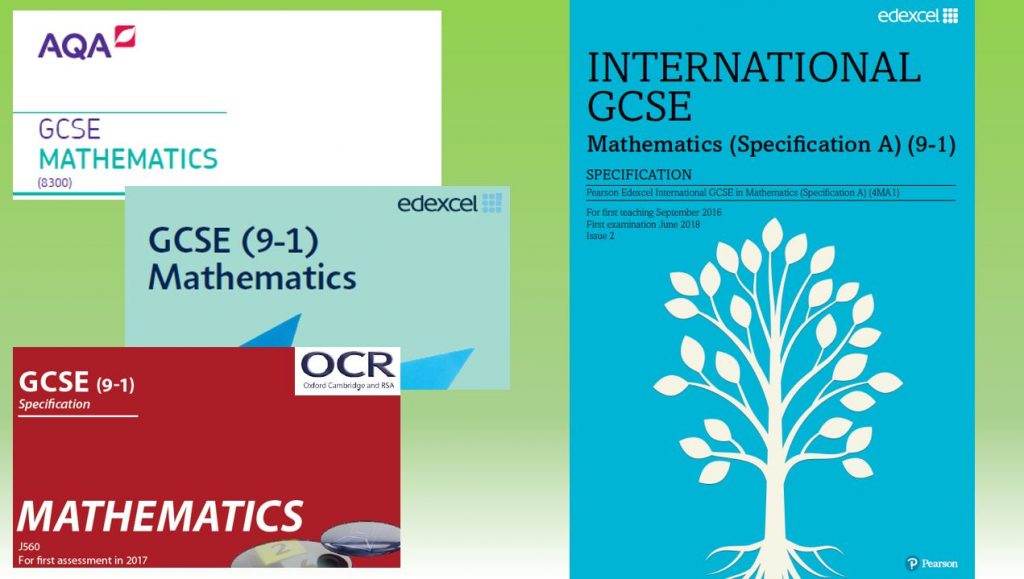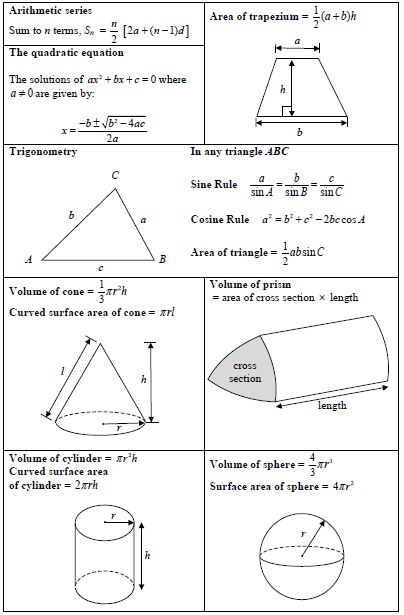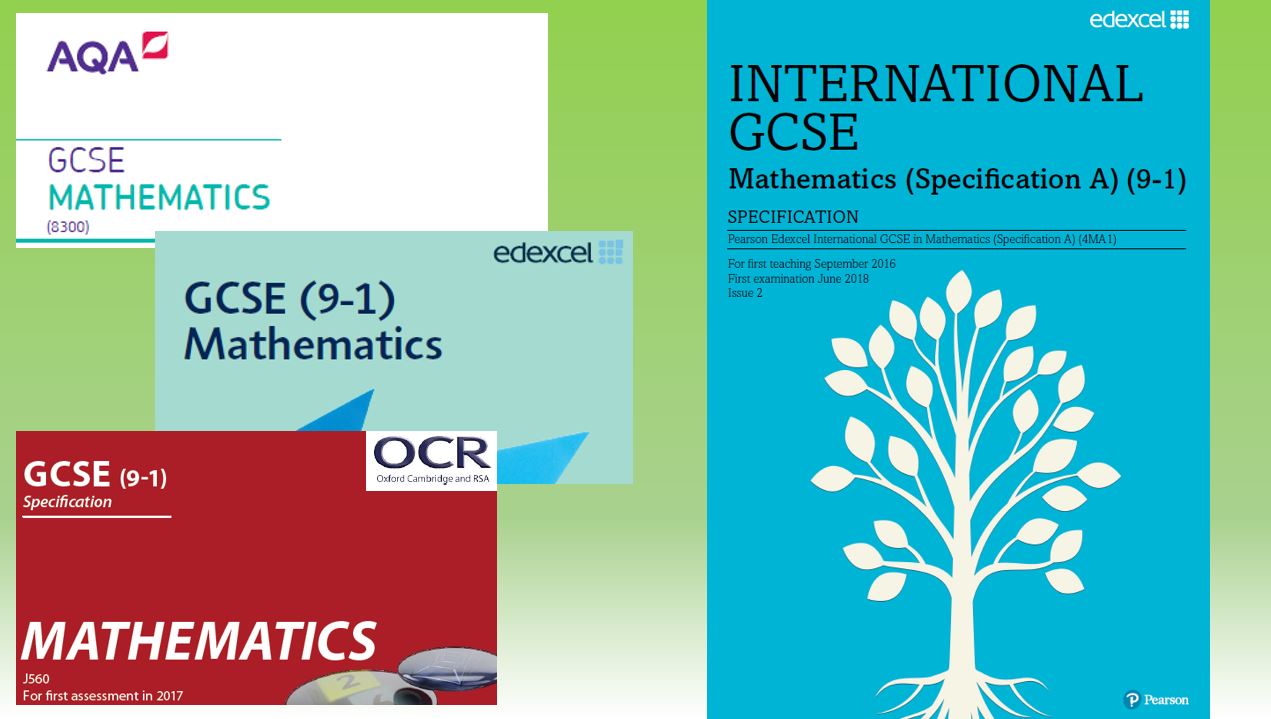What’s the difference between GCSE and IGCSE Maths?
Are you unclear on how GCSE and IGCSE Maths differ from each other? This article aims to help you understand the differences between the English GCSE Maths qualification and the Edexcel International GCSE.
Note: The Cambridge IGCSE, although briefly mentioned, is not included in this comparison.
Introduction
The GCSE (General Certificate of Secondary Education) is the standard Maths qualification taken at age 16 (the end of Year 11) by students in English state schools and some independent schools. The specification is prescribed by Ofqual, the Government agency in charge of qualifications, and is nominally the same across all the exam boards that offer it, although there are some minor differences in interpretation.
The main exam boards for GCSE Maths are AQA (specification code 8300), Edexcel (1MA1) and OCR (J560).
The Edexcel International GCSE (Specification A; code 4MA1) cannot be offered in state schools as it is not regulated in the same way, but many independent schools choose to offer it instead of the GCSE, as there is some perception that it’s slightly easier. In terms of access to A-level and other Level 3 courses, it is normally regarded as being equivalent.

Edexcel also offer a Specification B qualification (code 4MB1) which is available at Higher Tier only and includes some different topics such as matrices. Since matrices aren’t in the English A-level Maths specification, I believe that Spec B is aimed more at overseas institutions – perhaps those offering the International Baccalaureate in lieu of A-levels? Personally I’ve only encountered Spec A and so that’s what the content of this article is based on.
The IGCSE papers are more formulaic and predictable than those for GCSE. This is partly because the IGCSE is written with non-native English speakers in mind and so the wording is kept as simple as possible. It could, of course, also be argued that Pearson (who own Edexcel) keep it slightly easier to boost uptake!
There is also a Cambridge IGCSE with two variants (0580 and 0980) – in fact Cambridge holds the trademark for the “IGCSE” name and so, strictly speaking, it shouldn’t really be used to refer to the Edexcel qualification; you won’t see Edexcel themselves calling their own qualitification “IGCSE”, though the abbreviation is in common use generally. Unfortunately I’m not sufficiently familiar with the Cambridge specifications to comment on them, except to say that they are primarily used by overseas schools. Any further mention of IGCSE in this article refers to the Edexcel International GCSE Specification A, as taught in many independent schools in England.
Exam format
Both GCSE and IGCSE are graded from 1 to 9 – with 9 being the top grade – and have the option of a Foundation or a Higher Tier. On Foundation it’s possible to achieve up to a Grade 5; Grade 4 is a Level 2 pass, equivalent to a Grade C on the old scale. On Higher Tier you can get Grades 4 to 9… or a U, which is a fail. If you’re doing Higher Tier and only just miss a Grade 4 then you may be awarded a 3 – effectively a “nearly a pass” grade.
So you should only take the Higher Tier if you can confidently expect to get at least a Grade 4 and are really aiming for 6 or above. Approximately 50% of the marks on the Higher paper are aimed at Grade 7 and above (this is the usual requirement for entry to an A-level Maths course), so most of a Higher paper will be inaccessible to someone who’s doubtful of achieving Grade 4.
Both GCSE and IGCSE are entirely exam-based; there is no coursework element in either qualification.
The GCSE exam consists of three papers, all the same Tier and each 90 minutes in length. For AQA and Edexcel, Paper 1 must be completed without the use of a calculator, but calculators are allowed for Papers 2 and 3. For OCR it’s Paper 2 that’s non-calculator. (For information on which calculators are appropriate for both the GCSE and IGCSE exams, take a look at my Clueless about Calculators? blog post.) The main GCSE exam sitting is in May/June, with a resit opportunity in November.
The IGCSE exam (4MA1) consists of only two papers, each of 2 hours in duration and normally sat at the same time as GCSE Papers 1 and 2 in May/June. Again, you can’t mix Tiers. A calculator is permitted for both papers. Until 2023, the Edexcel IGCSE could also be taken in January, but from November 2023 it’s been brought into line with the other exam boards, with sittings in November and May/June.
For GCSE, the student is expected to learn most of the necessary formulae, but for IGCSE, a formula sheet is provided at the front of the paper.

Differences in content: Foundation
The differences between the the GCSE and IGCSE at Foundation level are fairly minimal.
You can find the Ofqual GCSE specification for both Foundation and Higher Tiers here (see the subject content section; underlined skills are required for Foundation, and the rest for Higher), though the exam board specifications linked above also provide the same information.
For Foundation Tier, the topics/skills that are in GCSE but not IGCSE are:
- error intervals
- inverse proportion (in Higher Tier for IGCSE)
- systematic listing strategies
- sequences: geometric, triangular numbers, square numbers, Fibonacci sequence
- criteria for congruence
- exact trig values for special angles
- loci
- constructing a perpendicular from a point to a line
- class interval containing the median
- 2-way tables
- bivariate data / scatter graphs / correlation
- stem & leaf diagrams (not explicitly on Ofqual GCSE spec but Edexcel includes it)
and in IGCSE but not GCSE:
- linear inequality graphs (shading regions)
- rate of change and tangent to a graph
(These are both in the GCSE but only the Higher Tier.)
Differences in content: Higher
The differences here are more significant.
For Higher Tier, the topics/skills that are in GCSE but not IGCSE are:
- geometric sequences
- nth term of a quadratic sequence
- exponential functions and exponential growth
- equation of a circle and of the tangent to a circle at a given point
- finding the area under a graph
- using iteration to find approximate solution to an equation
- systematic listing strategies: product rule of counting
- proofs of circle theorems
- frustum of a cone
- box plots (box-and-whisker diagrams)
- enlargement with a negative scale factor
and in IGCSE but not GCSE:
- intersecting chords theorem (in circle theorems)
- modulus of a vector
- sum of the first n terms of an arithmetic series
- understanding domain and range
- differentiation with positive and negative (but not fractional) indices
- using differentiation to find gradients and stationary points on a curve
- optimisation problems using differentiation
- applying differentiation to linear kinematics problems (displacement, velocity, acceleration)
Well, that’s it – I hope you’ve found this summary helpful. If you have any comments on this article, or requests for topics that you’d like me to cover in future posts, then please comment below!
If you’ve found this article helpful then please share it with anyone else who you think would benefit (use the social sharing buttons if you like). If you have any suggestions for improvement or other topics that you’d like to see covered, then please comment below or drop me a line using my contact form.
On my sister site at at mathscourses.co.uk you can find – among other things – a great-value suite of courses covering the entire GCSE (and Edexcel IGCSE) Foundation content, and the “Flying Start to A-level Maths” course for those who want to get top grades at GCSE and hit the ground running at A-level – please take a look!
If you’d like to be kept up to date with my new content then please sign up to my mailing list using the form at the bottom of this page, which will also give you access to my collection of free downloads.


Very helpful – thank you for taking the time and effort to research and write this.
Thanks, it’s nice to have my efforts appreciated!
Thank you so much for this post! I’m planning to sit IGCSE Maths this year and I’ve been struggling to find something that lays out the differences between both GCSEs and IGCSEs as clearly as this.
You’re very welcome – always good to hear when someone has genuinely found my content helpful.
(A lovely change from all the generic compliment spam I get from bots trying to post links.)
Good luck with the exam!
Much appreciated – a very concise presentation of the differences
Thank you!
As a tutor who has not taught iGCSE before this is very helpful. Thank you!
You’re welcome!
Do you have any free website where I can study these topics and more of the IGCSE syllabus in a short amount of time? Very helpful though.
I have another blog post with links to lots of resources, though it’s mainly focused on GCSE rather than IGCSE. Still, you know from this article which topics are applicable to your situation!
You can find the other post at https://b28mathstutor.co.uk/gcse-maths-resources/
My Grade 4 Essentials course at https://mathscourses.co.uk/collections/grade-4-essentials-for-gcse-maths/ covers all the Foundation content for IGCSE. It’s inexpensive but I’m afraid it’s not free. I don’t yet have a course that covers all of the Higher content but the FSALM course at https://mathscourses.co.uk/collections/fsalm/ covers a good chunk of it and will prepare you well for A-level if that’s what you’re planning to do.
Thank you for this post. I have just discovered that a student I am teaching is doing the IGCSE instead of the GCSE. You have answered all my questions. Thank you!
You’re very welcome; glad to be of assistance!
This is great, thanks so much Lynne! I know you say you aren’t entirely familiar with the Cambridge iGCSE and differences between core GCSE qualifications – do you know where we could go to find a similar comparison to what you have provided here for the Edexcel? Any signposting would be great! Thanks 🙂
Sorry, I’m afraid I don’t. It may have to be a matter of ploughing through the specifications.
Hi? Is there always a November sitting for IGCSE Mathematics A higher tier?
I’m glad you posted this question, as it’s drawn my attention to an update that I needed to make to this page!
Up to now, the Edexcel IGCSE (Spec A) has only been available in January and May/June – though due to Covid they have had some November sittings replacing the summer ones in the past couple of years. (The Cambridge International (CIE) exam series are in November and May/June, and there’s a GCSE resit opportunity in November.)
But from 2023, Pearson is bringing the Edexcel IGCSE into line with the other exam boards, with Jan 2023 being the final January series and a regular November series starting in 2023.
More details at this link (PDF).
Thank you so much. Very interesting.
Very informative, thank you.
Excellent explanation…thank you for this post.